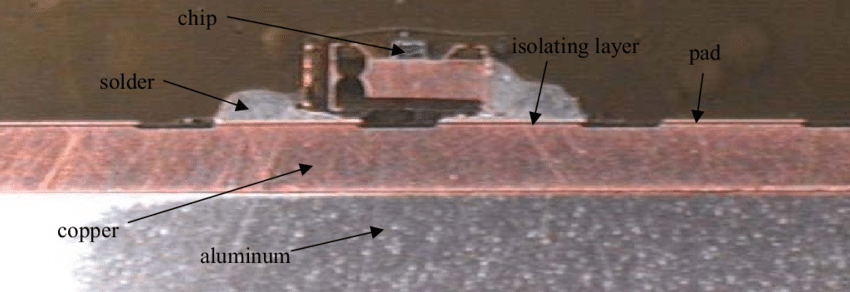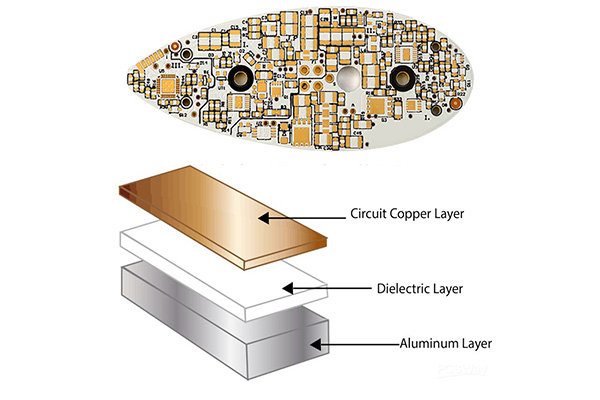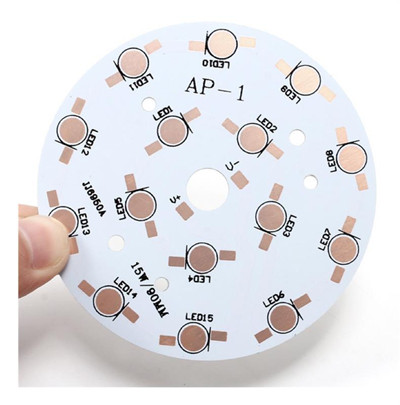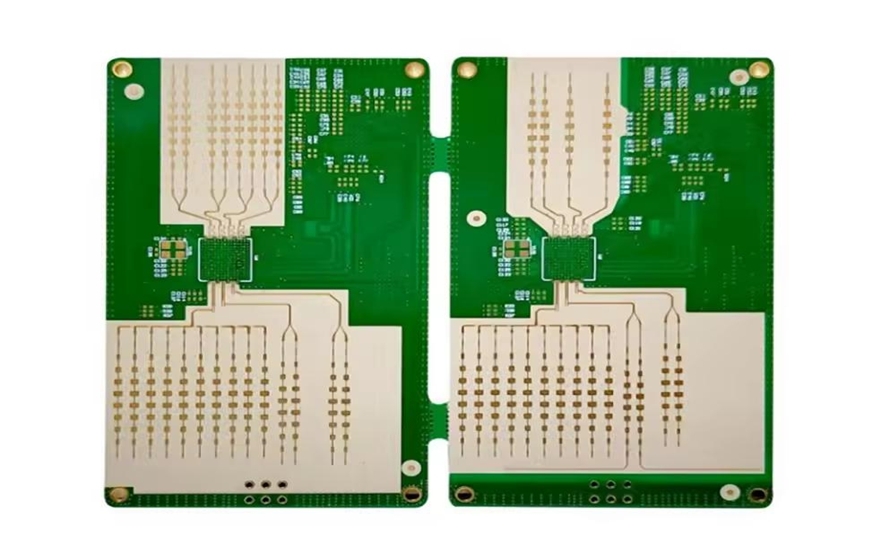In the high-stakes world of aerospace, every component must perform flawlessly under extreme conditions. Aluminum PCBs (Printed Circuit Boards) have emerged as a top choice for aerospace applications due to their exceptional durability, thermal management, and ability to withstand harsh environments. If you're wondering how aluminum PCBs meet aerospace PCB requirements and deliver reliable performance at high altitudes, in extreme temperatures, and under intense vibration, this blog dives deep into the details. We'll explore why aluminum PCBs are a game-changer for creating durable PCB solutions in aerospace and how they handle the toughest challenges.
At ALLPCB, we understand the critical role that reliable circuit boards play in aerospace systems. This comprehensive guide will walk you through the unique benefits of aluminum PCBs, their performance under pressure, and why they are ideal for cutting-edge aerospace technology.
Why Aluminum PCBs Are Essential for Aerospace Applications
Aerospace systems, from satellites to aircraft, operate in environments that push materials to their limits. Whether it's the freezing cold of high altitudes, the heat of re-entry, or the constant vibration during launch, every component must be tough and reliable. Aluminum PCBs stand out as a solution that meets strict aerospace PCB requirements due to their unique properties.
Unlike traditional FR4 boards made of fiberglass, aluminum PCBs feature a metal core, typically aluminum, which acts as a base layer. This metal core provides superior heat dissipation, mechanical strength, and resistance to environmental stressors. For aerospace engineers, this translates to a circuit board that can handle the demands of flight and space exploration without failing.

Key Benefits of Aluminum PCBs in Aerospace
Aluminum PCBs offer several advantages that make them ideal for aerospace systems. Let's break down the specific benefits that address critical needs like PCB vibration resistance, extreme temperature tolerance, and overall durability.
1. Superior Thermal Management for Extreme Temperatures
Aerospace equipment often faces extreme temperatures, ranging from -55°C at high altitudes to over 200°C during re-entry or near engines. Aluminum PCBs excel in these conditions because of their high thermal conductivity, often ranging from 1 to 2 W/m·K for the dielectric layer and much higher for the aluminum core itself. This allows heat to dissipate quickly, preventing overheating of sensitive electronic components.
For example, in a satellite orbiting Earth, internal electronics generate heat while external temperatures can drop drastically. An aluminum PCB ensures that heat is spread evenly across the board, reducing hot spots and protecting components from thermal stress. This makes aluminum a top choice for meeting PCB extreme temperatures demands in aerospace.
2. Lightweight Design for High Altitude Efficiency
Weight is a critical factor in aerospace design, especially for systems operating at high altitudes or in space. Every gram saved can reduce fuel costs and improve performance. Aluminum PCBs are lighter than other metal-core boards, such as those made with copper, while still offering excellent strength. This balance of lightweight construction and durability aligns perfectly with aluminum PCB high altitude requirements.
In practical terms, using aluminum PCBs in aircraft avionics or satellite control systems helps minimize payload weight without compromising on reliability. This is a key reason why aluminum is often preferred over heavier alternatives in aerospace projects.

3. Exceptional Vibration Resistance for Harsh Conditions
Vibration is a constant challenge in aerospace, especially during rocket launches or turbulent flights. Components must endure intense mechanical stress without cracking or losing connectivity. Aluminum PCBs provide excellent PCB vibration resistance due to their rigid metal core, which offers greater mechanical stability compared to traditional fiberglass boards.
Studies suggest that aluminum PCBs can withstand vibration frequencies up to 500 Hz and acceleration forces of 10G or more, depending on the design. This makes them ideal for applications like flight control systems or engine monitoring units, where durable PCB aerospace solutions are non-negotiable.
4. Durability and Longevity in Extreme Environments
Aerospace missions often span years, and components must remain operational without maintenance. Aluminum PCBs are highly resistant to corrosion, moisture, and other environmental factors, ensuring long-term reliability. Their robust construction meets the stringent standards of aerospace PCB requirements, making them suitable for both military and commercial applications.
For instance, in unmanned drones operating in harsh climates, aluminum PCBs maintain performance even when exposed to salt spray, humidity, or rapid temperature changes. This durability reduces the risk of failure and extends the lifespan of critical systems.
Meeting Aerospace PCB Requirements with Aluminum
The aerospace industry has some of the most demanding standards for electronic components. Aluminum PCBs are uniquely equipped to meet these aerospace PCB requirements through a combination of material properties and design flexibility. Below are the key criteria where aluminum PCBs shine.
1. Compliance with Industry Standards
Aerospace PCBs must adhere to strict guidelines, such as those set by the Institute of Printed Circuits (IPC) and military specifications (MIL-SPEC). Aluminum PCBs can be manufactured to meet standards like IPC-6012 for rigid boards, ensuring they pass rigorous testing for thermal shock, vibration, and environmental exposure.
These standards guarantee that the boards can operate reliably in mission-critical systems, from navigation to communication, without risk of failure. Partnering with a trusted provider like ALLPCB ensures that your aluminum PCBs are built to these exacting specifications.
2. High Reliability in Signal Integrity
In aerospace systems, signal integrity is vital for accurate data transmission. Aluminum PCBs, with their stable dielectric layers, minimize signal loss and electromagnetic interference EMI complaince testing. This is especially important in high-frequency applications like radar or satellite communication, where even minor disruptions can lead to catastrophic errors.
For example, a typical aluminum PCB might maintain impedance control within ±10% tolerance, ensuring consistent performance even under fluctuating conditions. This reliability is a cornerstone of durable PCB aerospace design.

Applications of Aluminum PCBs in Aerospace Systems
Aluminum PCBs are versatile and find use in various aerospace applications. Their ability to handle extreme temperatures, vibration, and high altitude challenges makes them indispensable. Here are some common use cases:
- Avionics: Aluminum PCBs power flight control systems, navigation, and communication equipment in aircraft, ensuring reliable operation under stress.
- Satellite Systems: In space, where temperature swings are extreme, aluminum PCBs manage heat and maintain functionality in control and power systems.
- Military Aerospace: Drones, missiles, and other defense systems rely on aluminum PCBs for rugged performance in hostile environments.
- Engine Monitoring: Near engines, where heat and vibration are intense, aluminum PCBs provide the durability needed for real-time monitoring.
Design Considerations for Aluminum PCBs in Aerospace
While aluminum PCBs offer many advantages, designing them for aerospace requires careful planning to maximize performance. Here are some tips to ensure your boards meet aerospace PCB requirements.
1. Optimize Thermal Design
Work with engineers to select the right dielectric material and thickness to balance thermal conductivity and electrical insulation. For high-power applications, consider a dielectric layer with a thermal conductivity of at least 1.5 W/m·K to manage heat effectively.
Suggested Reading: How to Choose the Best Dielectric Material for Aluminum PCBs
2. Reinforce for Vibration Resistance
Incorporate mounting holes, stiffeners, or conformal coatings to enhance PCB vibration resistance. These additions help secure the board and protect it from mechanical stress during operation.
3. Test for Environmental Extremes
Simulate conditions like extreme temperatures and high altitude pressure during the prototyping phase. Testing might include thermal cycling from -65°C to 125°C or altitude testing up to 50,000 feet to ensure reliability.

Challenges and Solutions with Aluminum PCBs in Aerospace
Despite their benefits, aluminum PCBs come with challenges that engineers must address to ensure optimal performance.
Challenge 1: Higher Manufacturing Costs
Aluminum PCBs can be more expensive to produce than standard FR4 boards due to the specialized materials and processes involved. However, their long-term reliability and reduced failure rates often offset the initial cost in critical aerospace applications.
Challenge 2: Limited Flexibility
Unlike flexible PCBs, aluminum boards are rigid, which can limit their use in compact or curved designs. Engineers can overcome this by integrating aluminum PCBs with flexible circuits in hybrid assemblies for complex systems.
Solution: Partner with Experts
Collaborating with a trusted manufacturer like ALLPCB can help navigate these challenges. With expertise in custom solutions, we ensure that your aluminum PCBs are tailored to meet specific aerospace PCB requirements while staying within budget and design constraints.
Why Choose ALLPCB for Your Aerospace Aluminum PCB Needs?
At ALLPCB, we specialize in delivering high-quality aluminum PCBs designed for the toughest environments. Our manufacturing processes adhere to strict industry standards, ensuring that every board meets the demands of durable PCB aerospace applications. Whether you need boards for high altitude missions or systems exposed to extreme temperatures, we provide customized solutions with fast turnaround times.
Our team of experts works closely with aerospace engineers to optimize designs for thermal management, PCB vibration resistance, and overall reliability. With advanced testing and quality control, we guarantee that your PCBs will perform under pressure.
Conclusion: Aluminum PCBs as the Future of Aerospace Electronics
Aluminum PCBs have proven themselves as a vital component in aerospace technology, offering unmatched performance in the face of extreme temperatures, intense vibration, and high altitude challenges. Their ability to dissipate heat, resist mechanical stress, and provide long-term durability makes them the go-to choice for meeting stringent aerospace PCB requirements.
As aerospace systems continue to evolve, the demand for durable PCB aerospace solutions will only grow. Aluminum PCBs are at the forefront of this innovation, ensuring that critical electronics operate reliably no matter the conditions. For your next project, trust ALLPCB to deliver aluminum PCBs that stand up to the pressures of aerospace environments.
 ALLPCB
ALLPCB







